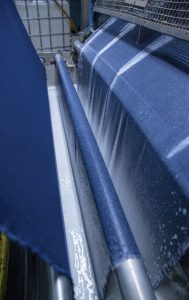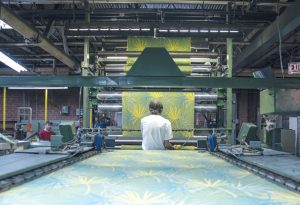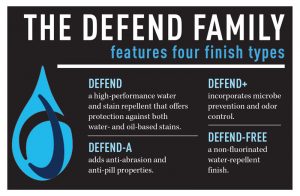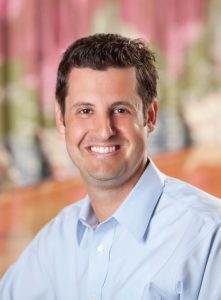
TSG Finishing enhances feel and functionality of fabrics.
TW Special Report
Whether produced using knitting, weaving or nonwoven processes, fabric most often moves along the supply chain to be dyed, printed and/or finished. Dyeing and printing adds color and pattern to untreated fabric, transforming it into today’s most popular hues or eye-catching designs.
Finishing — through either mechanical or wet processing methods — adds further value to a fabric by imparting enhancements that can improve the look, feel, functionality and performance of a fabric. Finishes can impart properties such as brightness, softness, embossed patterning, wrinkle resistance, shrinkage control, soil and water repellency, moisture management, flame resistance or abrasion resistance, among other properties.
Hickory, N.C.-based TSG Finishing LLC is an example of a forward-thinking finishing company.
Founded in 1901 in Baltimore, Maryland, by Jacob Levy as “Levy’s International Water Shrinking and Drying,” the privately-held company is now run by fifth-generation descendants. The business first thrived on preshrinking, shrinking and softening wool fabrics under the motto “We expand from shrinking.” In the 1920s, Levy opened a facility in Philadelphia to be closer to New England’s growing textile business.
After World War II, the company developed a process for foaming latex backings used in vinyl seat covers. This launched TSG into the upholstery fabrics market and led the company down to High Point, N.C., a hub for U.S. furniture manufacturing. Today, TSG’s finishing plants still operate out of Hickory with additional locations in East Conover, N.C., as well as executive office space in Pennsylvania.
While finishing wool fabrics for military dress uniforms has been an important part of the company’s business for the past 118 years, TSG’s current mission is to expand its finishing capabilities and offerings.
Upholstery finishing — including woven fabrics for furniture and wallcoverings for residential and contract markets — now accounts for approximately 60 percent of the company’s business. Much of the remaining activity is focused on what TSG CEO Brian Rosenstein terms “industrial products,” which includes filtration materials, medical products, automotive, crafts, geotextiles, apparel and a variety of other technical products.
The company offers a broad range of finishing services including coating, fabric impregnation, mechanical finishing, toll coating, engraving, material handling, as well as warehousing and distribution. Coating and impregnation finishing provides antimicrobial, flame resistance, water and stain protection, among other treatments. “Being able to protect a fabric from both water- and oil-based stains is huge across multiple markets,” Rosenstein said. “In addition to upholstery, it’s also big in medical right now. Essential to producing medical nonwovens is providing a fabric that will keep doctors and surgeons protected. But it has to be breathable and have antistatic properties as well. We’re playing a critical role in that supply chain.”

customers with the exact finish they are looking for.
Defend® — “Your Fabric + Our protection™”
TSG’s branded upholstery finish is known as DEFEND®, which the company relaunched in 2017 for its water- and stain-repellent technology. Still, as a historically technical company, incorporating a brand marketing strategy was a new path. “We redefined ourselves and shifted out of our comfort zone as we moved into marketing,” Rosenstein said. “Our previous mantra was we’re the guy behind the guy behind the guy. But for the most part today, the market demands a name and a story. You need to have a brand.” With that in mind, TSG also trademarked the tagline “Your fabric + Our protection™,” which simplistically, but effectively captures what the company does and helps to market the brand.
DEFEND was originally developed for the woven residential and contract business, but it’s starting to break into other markets as well, according to Rosenstein. For example, denim producers and the U.S. military have shown interest in DEFEND. “What makes DEFEND special is that we can apply it to any fabric,” Rosenstein said. “There are no limitations. You want to protect a high pile velvet? Fine. High-end linen — no problem. Embroidered silk — bring it on. A treatment for a military camouflage product that can only be treated on one side — done.”
“I can’t imagine that we would be unable to apply DEFEND to any product,” Rosenstein said.
 Customer-Driven Products
Customer-Driven Products
TSG has a library of technologies that it draws from, but business is often customer-driven.
“On the one hand, we’ve really started to push and market the DEFEND brand, but people are knocking on our door more than ever to solve problems that don’t involve our core business of woven upholstery fabric,” Rosenstein mentioned.
The company fields phone calls from customers — including Fortune 500 companies — looking for a partner to help them achieve a certain look or set of properties in a finished fabric. Even in cases where production has yet to be attempted, TSG approaches each new proposal with a “not yet,” rather than a “no” attitude. “We have a saying around here that ‘the difficult we can do now, the impossible just takes a little longer,’” Rosenstein said.
Tackling Challenges With Innovative Thinking
According to Rosenstein, “One of the cool things about the job is seeing all the different, highly-innovative things that we are able to do with our existing equipment.”
The existing equipment Rosenstein is referring to is a tenter frame — a piece of equipment for drying fabric while it is stretched and held under tension between two parallel chains — which is central to most textile finishing operations. Options built into a tenter frame can differ, but the basic functions of the machine are the same. But according to Rosenstein, what can be done using that machine both before the fabric enters the machine and after it comes out is something that TSG has excelled at over recent decades.
“Our company is built on intellectual property and strong partnerships,” Rosenstein said. “Anyone can go out and buy a tenter frame, but it’s what we are able to do with that tenter frame that sets us apart. We will custom design and build our own chemical coating systems for a customer. We will stand behind and protect what we believe is rightfully ours, but we also recognize the benefit of partnering with both suppliers and customers. In today’s day and age, you cannot maintain a solid business if you don’t value those relationships.”

CEO, TSG Finishing LLC
Future Growth
According to Rosenstein, innovations and staying ahead of design trends are key to remaining successful in the finishing industry. “Design trends really push the finishing industry,” Rosenstein mentioned. “The latest is this idea of Resimercial, where workspaces are created and designed to be more reflective of your living room. We now need to take woven fabrics that used to be relegated to the part of the home that was seldom used, fabrics like decorative velvets, and find ways to make them work in heavy traffic workspaces. TSG can definitely help prolong the life of those fabrics using DEFEND so they don’t have to be replaced every other year. And imagine what that could do for the environment?”
Other growing areas of TSG’s business include building and filtration products. When Mother Nature bears her teeth, the company is proud to help consumers get back on their feet. “When there are tornados or hurricanes and people lose their homes or the roofs, our fiberglass services provide durable solutions to people in need,” Rosenstein noted. “Business on the filtration side is also increasing because of the wildfires in California. The air quality out there is really bad so there is an increased demand for air filtration products.”
Rosenstein sees definite opportunities for TSG in the future. The diverse nature of the company’s business and involvement in many different markets allows for the technology crossover and product diversification in which TSG finds strength. “We’ve been spread out and diversified over the years, which might lead some to say we cannot focus on any particular area to give it the attention it deserves,” Rosenstein said. “But the fact that we were so diversified and involved in so many markets helped us through the recession. When one market is down, another one is up. That diversification, along with our inability to say ‘no,’ now exposes us to growth areas and sales opportunities.”
“I think if my great-great-grandfather were alive right now, he would be absolutely astonished to see some of the stuff we are running on those finishing machines,” Rosenstein mused. But Jacob Levy may be equally surprised to see the company also staying true to its roots finishing those military wool fabrics as it did back in 1901.
Editor’s Note: This article appears in Textile World courtesy of the National Council of Textile Organizations (NCTO) as part of the “American Textiles: We Make Amazing™” campaign. NCTO is a trade association representing U.S. textile manufacturing. Please visit ncto.org to learn more about NCTO, the industry and the campaign.
November/December 2019




